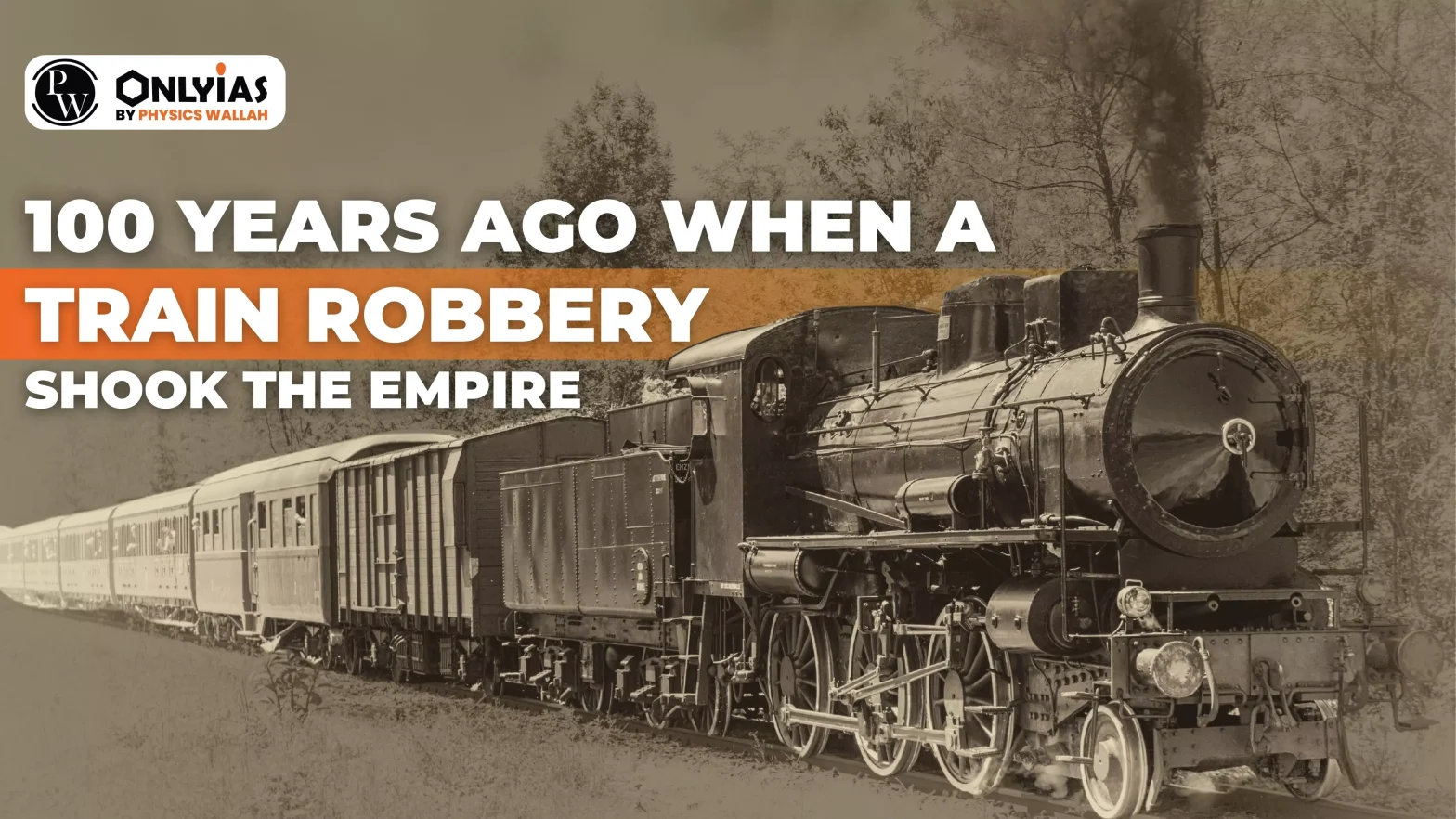On August 9, 1925, a railway station nearly 20 kilometres from Lucknow witnessed one of the most daring events of the Indian freedom movement.
| Relevancy for Prelims: Kakori Train Robbery, Hindustan Republican Association (HRA), key figures involved in Kakori Train Robbery, etc.
Relevancy for Mains: About Kakori Train Robbery, Roles and contributions of key figures involved, etc. |
Kakori Train Robbery
- That day, 10 men boarded the Saharanpur-Lucknow passenger train at Kakori station and, minutes into the journey, pulled the chain.
- The train stopped nearly 2 kilometres from Kakori, at a village called Bajnagar.
- The revolutionaries acted as they had planned, and looted money meant for the British treasury that were being transported by rail.
- The audacious act, famously known as the Kakori case or the Kakori train robbery conspiracy case, shook the British government and accelerated the freedom movement.
- This year marks the 100th year of the incident — on Friday, August 9, UP Chief Minister Yogi Adityanath launched the centenary celebrations.
Enroll now for UPSC Online Course
- The Kakori case was the first major action executed by the Hindustan Republican Association (HRA), a revolutionary outfit set up in 1924 by, among others, Ram Prasad Bismil, Ashfaqullah Khan and Sachindra Nath Bakshi.
- Bismil, who hatched the robbery plan, was joined in its execution by Ashfaqullah Khan, Rajendra Lahiri, Chandrashekhar Azad, Sachindra Nath Bakshi, Keshab Chakravarthy, Manmathnath Gupta, Murari Sharma, Mukundi Lal and Banwari Lal.
- While the revolutionaries only intended to rattle the British government, the death of a passenger named Ahmad Ali, when the Mauser gun of one of the revolutionaries accidentally went off, hurt their cause.
- Of the accused who were made to stand trial at the Special Sessions Court of Justice Archibald Hamilton, 19 persons were convicted.
- Bismil, Roshan Singh, Rajendra Nath Lahiri and Ashfaqullah Khan were sentenced to death while the others got varying jail terms, including a deportation to the infamous Kala Pani (Cellular Jail in Port Blair) for five of them.
- On December 17, 1927, Lahiri was hanged at Gonda jail.
- Two days later, on December 19, 1927, Ashfaqullah, Roshan and Bismil too were put to death – Ashfaqullah at Faizabad jail, Roshan at Naini (Allahabad) jail and Bismil at Gorakhpur jail.
- Bismil was arrested in October 1925, supposedly after two members of the HRA betrayed him.
- While he was being taken to the gallows, Bismil is said to have famously sung Sarfaroshiki tamanna ab hamare dil mein hai; Dekhna hai zor kitna baju-e katil mein hai, the ghazal that went on to become an immortal war cry for freedom fighters.
- Ashfaqullah Khan escaped to Nepal and then Daltonganj (Jharkhand).
- He was arrested a year later.
- Chandrashekhar Azad was the only major revolutionary associated with the HRA who evaded arrest (he shot himself dead when surrounded by police in Allahabad’s Alfred Park on February 27, 1931).
- The park now goes by the name Chandrashekhar Azad Park.
- A visit to Kakori station and Shaheed Smarak, a memorial dedicated to the revolutionary.
- The road between Kakori railway station and Bajnagar, two key signposts in the freedom movement, is in poor shape.
- The old railway office at Kakori still exists and has been developed into a museum.
- A notice board near the building details the incident and mentions that a total of Rs 4,679, one aana and 6 pai was looted.
- While the sum stolen was paltry, the act was an audacious snook at the British Raj, whose response to Kakori was to set an example for future revolutionaries and restore British authority in the minds of the people.
Defence Lawyers Who Became CMs
- The Kakori case had its ramifications on the country in the days after Independence.
- The first and third chief ministers of UP —Govind Ballabh Pant and Chandra Bhanu Gupta — were defence advocates in the case while Jagat Narain Mulla, a Congress member who was appointed minister in 1921 in the United Provinces of Agra and Oudh, represented the prosecution side.
- Jagat Narain Mulla, who quit the Congress and joined the Liberal Party, died in 1938.
- His son Anand Narain Mulla, who was also part of his legal team in the Kakori case, was in August 1954 elevated as judge of the Allahabad High Court.
- He went on to have a political career — he was elected to the Lok Sabha as an Independent candidate in 1967 from Lucknow and was elected to the Rajya Sabha in 1972 as a Congress nominee.
Check Out UPSC NCERT Textbooks From PW Store
- The Opposition was quick to attack the Congress for its proximity to A N Mulla, reminding the ruling party that he had worked to defend the British state in the Kakori trial.
- On April 8, 1973, then Prime Minister Indira Gandhi released A N Mulla’s book of poetry, Siyahi Ki Boond.
- A particular couplet in the book —“Khoon-eshaheed se bhi hai keemat mein kuchh siva; Fankar ke kalam ki siyahi ki ek boond (A drop of ink from the pen of poet is more worthy than the blood of martyr)” — would go on to rock the UP Assembly on April 18, 1973, with members alleging that it was disrespectful to martyrs.
- An adjournment motion was moved by Rajendra Pratap Singh (Congress-O MLA from Sataon, Rae Bareli), who alleged that Mulla had been awarded for acting against freedom fighters.
- “Due to that (for being on the prosecution side), he was elevated as a judge. Yahi unki fanqari thi (This was his only art).”
- CM Kamlapati Tripathi, however, defended Mulla, “He was an advocate, he practised law. He was general secretary of the Congress and was in the Liberal Party as well.
- He should not be termed a traitor because of his legal practice.”
- Speaking in the House, Sachindra Nath Bakshi, one of the convicts in the train robbery case who was elected MLA of the Bharatiya Jana Sangh from Varanasi South in 1969, narrated an incident related to the Kakori trial
- “One day the special judge was at lunch and Ashfaqullah and I were present in the court.
- Jagat Narain Mulla (the senior prosecution lawyer in the Kakori case) came there and I was talking to him. Ashfaqullah sahib didn’t recognise him (Mulla).
- I introduced them and requested Ashfaqullah to sing a couplet. Ashfaq responded with: ‘Chalo yaron ek Rig Theatre dikhayen tumko naya liberal, jo chand sim-o-jar ke tukdon par, naya tamasha dikha raha hai (Friends, let us visit Rig Theatre; I will show you a new Liberal who will regale you for a small amount of money).”
Enroll now for UPSC Online Classes
Conclusion
The Kakori Train Robbery symbolized resistance and reshaped India’s freedom struggle. Its centenary highlights enduring legacies and complex historical narratives.
![]() 13 Aug 2024
13 Aug 2024

